"The rise of dramatic naturalism was favored in France by the example of the novelists. Balzac, with his all-embracing comédie humaine; Flaubert, with his finely wrought fictions, minutely faithful in observation and expression; the de Goncourt brothers, with their meticulous striving to represent the pathological; Daudet, with his polished and ironical mingling of the romantic and the realistic de Maupassant, the pupil of Flaubert, with his tales beautiful in workmanship yet fearless in their reflection of the actual ; and finally Zola— big, coarse, brutal, gorging himself on human documents, and pouring out floods of turgid epic eloquence: all these prepared the way for naturalism on the stage...Vice and crime are the themes of the naturalists, morbid longings, distraught minds, sordid evils of the social system. Life, they argue, must be faced in its grimmest and most horrible aspects; only so can it ever be improved" (Chandler, 1920 pp 51-52).
French realism of the late 19th century was liable to offend British and American critics, in the latter case for example Ingersoll (1900): "The modern French drama, so far as I am acquainted with it, is a disease. It deals with the abnormal. It is fashioned after Balzac. It exhibits moral tumors, mental cancers and all kinds of abnormal fungi,— excrescences. Everything is stood on its head; virtue lives in the brothel; the good are the really bad and the worst are, after all, the best. It portrays the exceptional, and mistakes the scum-covered bayou for the great river. The French dramatists seem to think that the ceremony of marriage sows the seed of vice" (pp 528-529).
Honoré de Balzac
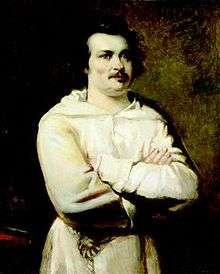
In the late 19th century, French theatre is ably represented by Honoré de Balzac (1799-1850) with "La marâtre" (The stepmother, 1848) and "Mercadet, le faiseur" (Mercadet, the speculator, 1851), worthy to be placed next to his novels. More minor works include "The school of home maintenance" (1839), "Vautrin" (1840), and "Pamela Giraud" (1843). In the latter play, Pamela compromises her reputation by perjuring herself in court that she was with her lover, Jules, without her parents' consent to save him from being falsely accused of a plot to overthrow the government.
"Mercadet, the speculator" is inspired by François Rabelais' "Tiers livre" [Third book, 1546). Mercedes defends the use of being in dept to his wife in a manner analogous to Panurge's defense to Pantagruel (Fess, 1925 pp 55-56). "This play is truly living. Occasionally the veil of formality and shallowness is rent apart, and one gains a glimpse of the dark stream of time carrying all with it, and one understands a little of the working of men's minds" (England 1934, p 190).
"The stepmother"
Time: 1829. Place: Louviers, France.
Text at http://www.archive.org/details/stepmothermercad00balziala https://archive.org/details/dramaticworksofh02balziala http://www.readbookonline.net/title/21005/
The count of Grandchamp, a retired general in Napoleon's army, and his wife, Gertrude, are thinking of the future of Pauline, his daughter of a previous marriage. In her stepmother's view, Pauline should marry a wealthy landowner, Godard. Both are surprised when Pauline rejects him, because she secretly favors Ferdinand, her father's clerk and an old love of Gertrude's. Although Ferdinand desires to marry her, he cannot, being the son of a general who abandoned Napoleon, and therefore one whom Grandchamp will never accept as son-in-law. Godard desires to discover whether Pauline loves Ferdinand. He enlists the help of Napoleon, the general's twelve-year old son, who shouts that Ferdinand has fallen downstairs, whereby Pauline swoons, confirming Godard's suspicion. Godard reveals this information to Gertrude, who betrays to him her own feelings for Ferdinand, with whom she wishes to renew her amorous relation begun before her present marriage. To scrutinize further into Pauline's sentiments, Gertrude lies to her by saying Ferdinand is already married, but she appears unmoved at this, as Ferdinand is when she lies a second time by saying that the general will command Pauline to marry Godard. "You hate her, and in this word "hate" there is more love for me than in anything you have said to me these two years," Pauline admits to her lover. When Gertrude sees the two together, she threatens to reveal this to her father, but Pauline feels safe, knowing she can threaten back with the love-letters Gertrude wrote to Ferdinand which he still possesses. When Gertrude begs Ferdinand to remain hers, he refuses. As a result, she discloses Pauline's love of Ferdinand to her husband. Pauline denies it even before her lover's face. Alone with Gertrude, Pauline reveals she has entered Ferdinand's room and obtained her love-letters. As they drink tea with the general and Godard, the latter ready to reveal Ferdinand's identity, Vernon, the family doctor, notices Gertrude pour something into Pauline's cup. Unnoticed, he takes it away from her and discovers the taste of laudanum, because of which Pauline dozes off, carried to her room with a servant's help by Gertrude, who finds the letters and burns them. Vernon confronts her with the laudanum, but she utters vaguely that four lives are now at stake concerning this matter. On awaking, Pauline suggests to Ferdinand that they should elope this very night, but they are intercepted by Gertrude. Cornered, Pauline steals poison from Gertrude's room, discloses Ferdinand's identity to Vernon, and pretends to accept Godard as her husband. Gertrude enters with tea for her, into which Pauline drops the poison and drinks it. As she lays dying, the examining magistrate wonders why Vernon, knowing about the laudanum, failed to prevent Gertrude from poisoning her stepdaughter. Gertrude is astonished at being accused of poisoning, guesses the truth, but is unable to prove her innocence until Pauline reveals the choice of suicide was hers. In despair of losing her, Ferdinand also swallows the poison.
"Mercadet, the speculator"
_(14763441284).jpg)
Time: 1840s. Place: Paris, France.
Text at http://www.gutenberg.org/ebooks/14246 http://www.readbookonline.net/title/22025/ https://archive.org/details/dramaticworksofh02balziala
Heavy with debts, Mercadet has spread rumors that his daughter, Julie, is about to marry De la Brive, a rich man. This fortunate piece of news convinces one of Mercadet's creditors, Boulard, to write for him a letter in support of a delay to his other creditors, as well as 1,000 crowns, in exchange for information relating to the 350 shares in Basse-Indre stock Boulard should sell. The devious Mercadet reveals to his wife the purpose of this maneuver. "It is in the interest of my friend, Verdelin, to cause a panic in Basse-Indre stock," he confesses. "This stock has been for a long time very risky and has suddenly become of first-class value, through the discovery of certain beds of mineral, known only to those on the inside." Next, he obtains 6,000 francs from another creditor, Violette, as an investment for a new kind of pavement. To entertain his future son-in-law, he needs from Verdelin 1,000 crowns and his dinner service and for him to come and dine at his house with his wife. Violette at first resists giving him the money but at last yields to the pleadings of Julie. However, Mercadet's plans are in danger to be upset by Julie's reciprocated love of Adolphe, a mere book-keeper. As previously done with his creditors, Mercadet assures Adolphe he is a ruined man. "All payments are made in alphabetic order," he says as he reveals papers of his long list of creditors. "I have not yet touched the letter A." This frightens Adolphe, but he nevertheless remains loyal to Julie. "I will render her happy by other means than my tenderness," he declares. "She shall feel grateful for all my efforts, she shall love me for my vigils and for my toils." Yet he cannot have her. "A brilliant marriage for my daughter is the only means by which I would be enabled to discharge the enormous sums I owe," Mercadet tells him, pleading not to force her to a life of poverty. Heartbroken, Adolphe accepts this viewpoint. Though De La Grive also owes a great deal of money, he has lands to be exploited and so Mercadet accepts him as a son-in-law, each thinking the other richer than he is. However, Mercadet discovers in time from Pierquin, another of his creditors, about the extent of De La Grive's debts and the poor prospect of his lands and so dismisses him. As a result, an angry Verdelin threatens him. "Pierquin tells me that your creditors are exasperated and are to meet tonight at Goulard's house to conclude measures for united action against you tomorrow," he reveals. Adolphe returns with money from a legacy of 30,000 francs, so that Mercadet, moved by this generosity, consents at last to give him his daughter's hand in marriage. Next, to calm down his creditors, he proposes to De La Grive to pretend he is Godeau, a man who once robbed him, returned with the stolen money. Although De La Grive agrees at first, Mercadet's wife makes him realize the danger of that operation and so he desists. Thinking Godeau's arrival imminent, Mercadet brazens it out with his creditors, asking Adolphe to supply his 30,000 francs as if they came from Godeau. The creditors go to him and, to Mercadet's astonishment, receive the full amount owed them, for the real Godeau has arrived.
Emile Zola
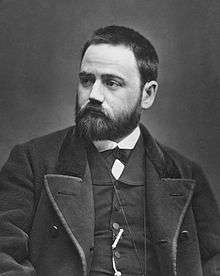
Emile Zola (1840-1902) adapted “Thérèse Raquin” (1873) from the novel of the same name (1867). Zola also wrote "Renée" (1887), based on another novel, "The kill" (1872). In the latter play of more minor interest than “Thérèse Raquin”, Renée is raped by the father of one of her friends. To avoid being ostracized, she agrees to marry Aristide Saccard provided they live apart. Thanks to the head-start he has with her money, Aristide accumulates a great deal of wealth with financial speculations during the course of ten years while Renée becomes infatuated with Aristide's son from a previous marriage, Max. Unknown to Aristide, they engage in sexual relations. Aristide comes to love Renée, but she refuses her husband as a bed-partner. To bind her more closely to him and to pay off her debts, Aristide proposes to sell some of her land-property without informing her he is the buyer, but Max discovers the trick and reveals it to her. She proposes to leave her husband for Max, but the latter refuses, preferring instead to marry Ellen, daughter of the Swedish ambassador, a choice Aristide approves of so that he can speculate on his silver mine. Disgusted with everything, Renée shoots herself to death with Aristide's pistol.
Zola is associated with naturalism. “Naturalism signifies not only a strict, often extreme, mode of realism, but a rather narrow dogma introduced into dramatic theory by Emile Zola in 1873, in his...preface to ‘Thérèse Raquin’…Zola’s program for the theatre called upon writers to concentrate on data arrived at objectively...The strictly naturalistic view was mechanistic, physiological, and deterministic. The individual was to be exhibited as the product, puppet, and victim of the inexorable forces of heredity, instinct, and environment, for man was to be regarded as a wholly natural object subject to natural processes” (Gassner, 1956 p 67).
“Thérèse Raquin" "consists in the working out through character of the necessary consequences of a given action. And that action in itself is not fortuitous but had resulted, in its turn, from the contact of character with character. In a word, Zola succeeded measurably in using a logic 'not of facts but of sensations and sentiments'. The play contains in addition that close-packed portrayal of milieu and character which is characteristic of the best dramatic work of its kind. As in his novels, to be sure, Zola could not wholly escape the lurid. The paralysis of Mme Raquin, her late discovery of her daughter-in-law's guilt, the dreadful revenge of the silenced woman- these are the fruits of Zola's romantic appetite for the monstrous and merely horrible. Yet 'Thérèse Raquin', with its stringent evolution, its unity of place and its strong verisimilitude, bears witness to the power and intelligence if not to the fineness and genius of its author's mind“ (Lewisohn, 1915 pp 37-38). In the view of Chandler (1920), Zola "thought himself a naturalist; as a matter of fact he idealized the low, the brutal, the sensational. His style was ponderous and blunt rather than graceful and keen; he professed to be scientific but was often guilty of straining for effect" (p 58). A more positive tone is sounded by Matthews (1881). "'Thérèse Raquin' is a grim and ghastly drama, full of main strength and directness, and having the simplicity of genius...The figure of the paralyzed Madame Raquin, ever present between the two murderers of her son, like a palpable and implacable ghost, gazing at them with eyes of fire, and gloating motionless over their misery, is a projection of unmistakable power" (p 280).
“Thérèse Raquin”
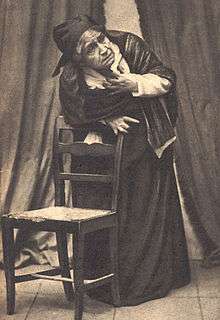
Place: Paris, France. Time 1870s.
Text at ?
After taking care of her sick uncle in her youth, Thérèse married his son, Camille Raquin, but is disenchanted about their marriage life, partly due to his poor health. She has a lover, Camille’s best friend, Laurent. They dream of spending their life together. To cover her tender feelings for him, she pretends to dislike him in social gatherings. All their friends and Thérèse’s mother, Mrs Raquin, are taken in by her subterfuge. To thank his friend for painting his picture, Camille proposes that he and his wife take Laurent along with them for a day trip at Saint-Ouen, where the lovers seize their opportunity by murdering him when Laurent overturns the longboat and saves only Thérèse from drowning. One year later with Thérèse still in pretended mourning, a family friend, Michaud, convinces Mrs Raquin that the best thing for Thérèse would be to marry Laurent. She reluctantly agrees. Laurent and Thérèse are joined in marriage, only their happiness is all too brief, starting on their wedding night, when thoughts of the murdered man creep into their heads. Thérèse cries out in protest when her husband lovingly takes hold of her. In frustrated rage, he takes down his painting of Camille from the wall and blurts out in Mrs Raquin’s hearing as she enters to find out the cause of Thérèse’s cries that the two are guilty of Camille’s murder. As a result, Mrs Raquin has an apoplectic fit and is unable to speak or move. To the horror of the guilty couple, one night while playing dominoes with their friends, Mrs Raquin recuperates to the extent of jotting down a message regarding the guilty couple, but stops short of accusing them of murder. Instead, she wishes to extend their sufferings by deliberately delaying the revelation to others, to have it hang over their heads whenever people visit them. Overwhelmed with feelings of guilt, Laurent and Thérèse blame each other for the deed. To end it all, Laurent prepares his wife’s drink with a deadly dose of prussic acid while she prepares to stab him with a knife, only they discover each other's intention in time. Mrs Raquin rejoices in their sufferings. “I will let remorse jostle you one against the other like frightened beasts,” she declares. In despair, the couple drink the poison and die, too soon in Mrs Raquin’s opinion.
François de Curel
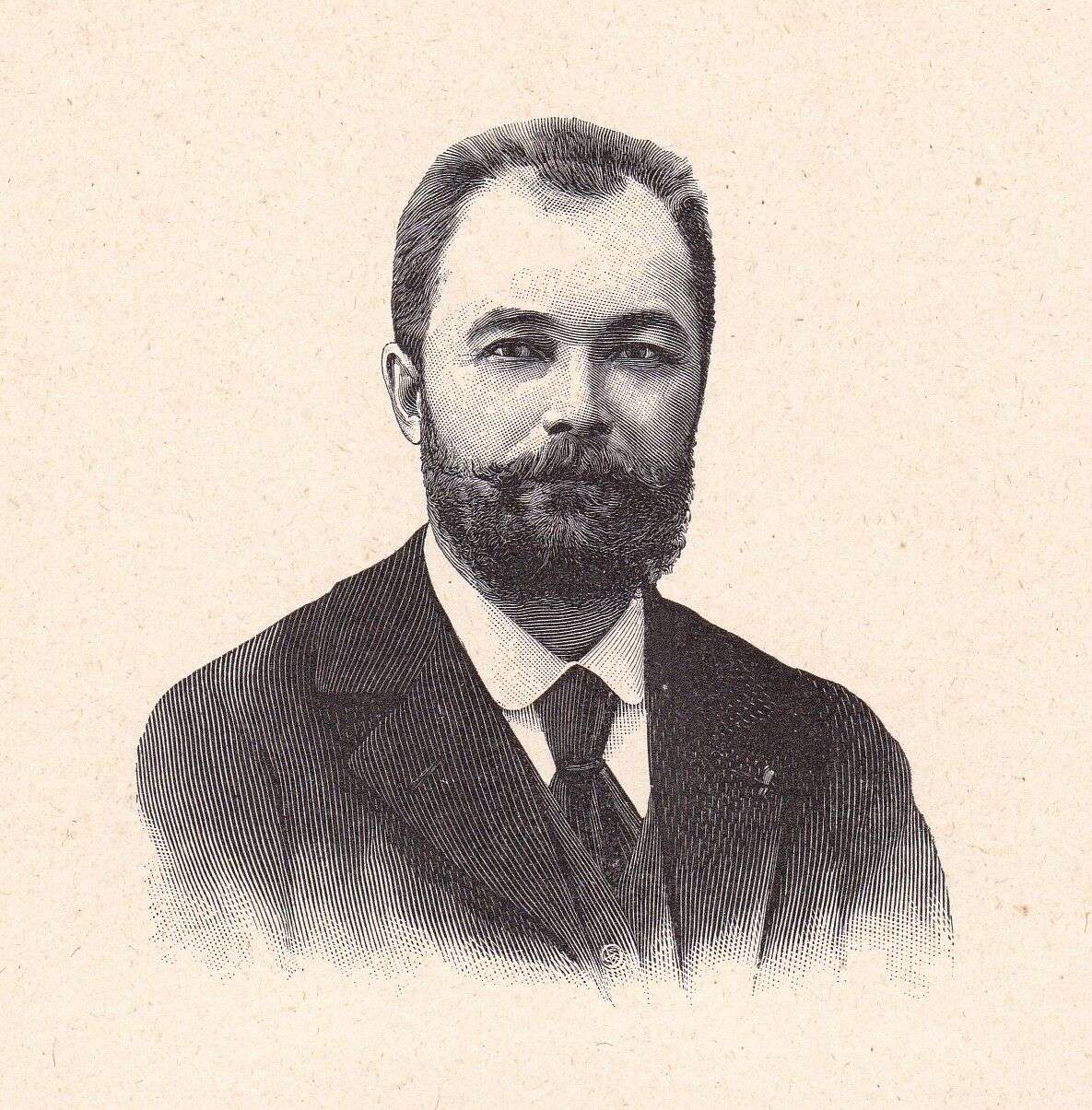
French realism was also represented by François de Curel (1854-1928), most strong with "Les fossiles" (The fossils, 1892). Curel also wrote "The reverse of a saint" (1892) about a woman named Julie who loses her chance to win a man because of her rival, Jeanne, is received in a convent, and, once the man dies, seeks to avenge herself against her. In "The guest" (1893), Therèse discovers her husband's infidelity, leaves him with her two daughters, and sixteen years later gets invited by him as a guest to take care of them. In "The new idol" (1899), a scientist injects dying patients with a cancer-causing microbe to test a vaccine against the disease. His quest of scientific discovery, society's new idol, is hindered when one of his patients spontaneously recovers from the last stages of consumption. The play shows misleading paranoia on the part of the author in regard to the relation between science and society.
In "The fossils", “the Duke de Chantemelle, who has passed his life in his own estates seducing peasant girls and killing boars, has but one idea in his brain and one single article in his moral and religious creed pride of race. The idea has been transmitted to his son Robert and his daughter Claire, but in an idealised form. Claire breathes into it all the passionate sorrow of a soul that has never met with love and is pining away in solitude; Robert interprets it with the delicate generosity and prophetic insight of a mind open to all the needs of the modern world. To him the nobility is sacrifice: let the old aristocracy resume the career of self-devotion, and it will again become worthy to lead society. Thus to all three natures, although for different reasons, the highest and most imperative duty is to perpetuate the race of Chantemelle” (Filon, 1898 p 119). "The play burns with the white heat of that unflinching dedication to an ideal of secular greatness and endurance. To be sure, we do not believe in Helène who speaks the unspeakable truth in virginal accents. But that is Curel, whose sense of measure and probability are lost in his passionate absorption. His work is unequal, violent and tortured at its best. But it is not easily forgotten, not lightly put aside. The man seems a changeling in his country of firm, sane and accomplished masters, of brilliant, well-tempered, intellectual achievement. His public recognition must always be partial and hesitant, and I am glad to pay this tribute to the genius- however turbid and however often touched with futility- of François de Curel" (Lewisohn, 1915 pp 62-63).
"If the nobility has lived its day, at least let it leave the impression of grandeur conveyed by those great fossils that make us dream of vanished ages. The strange and moving drama, with its tragic implications, awakens sympathy for these unhappy creatures caught in the mesh of circumstance. The old duke, imperious and decadent, draws down upon himself the punishment of heaven for his sin with Helene. She, who loves Robert, has earlier succumbed to the duke out of fear, and shivers at the thought of her crime. The sister of Robert shares his vision of the future and his conception of the duty of the younger generation to redeem the sins of the older. And Robert, wooing death in the very cradle of his race, but dreaming of a regenerated aristocracy that shall be worthy of its responsibilities, is a memorable figure. The speeches are prolonged, imaginative, poetic. The play is one of atmosphere, the background of the moldering castle and the wild forest harmonizing with the human foreground" (Chandler, 1920 p 193). "Depicting as it does the tragedy of a race, the agonies of a dying pride, the struggle between ancestral feeling and personal love and inclination, 'The fossils' is one of the noblest works of our time" (Clark, 1916 pp 10-11).
"From the Theatre-Libre de Curel learned to prefer the unusual, the brutal, and the sad, but his general ideas, his understanding of abnormal psychology, and his sense of beauty, have led him to transcend the works of his colleagues. He has curiously combined the real with the unreal, his plots and personages being often so novel as to challenge credence, yet his poetic fervor being suflBcient to win for them artistic faith for the moment. His work is marked by vividness of conception, intensity of passion, and the brooding of a speculative mind upon remote contingencies in human action. Primarily concerned with the individual, he centers attention upon two or three characters at most. His heroines, dominated by love, are fierce rather than tender; his men, controlled by other and stronger impulses, appear more sympathetic than the women. Technically, de Curel's dramas are better in exposition than denouement. The motives are too often obscure or unduly complex, and the dialogue is too diffuse or too explosive. On the other hand, de Curel displays skill in the coining of epigrams, in the management of background and atmosphere, and in the presentation of the pathetic. Whether dealing with ideas or states of soul, he fuses the real and the romantic. More than any other writer for the French stage, he reveals the temperament and personality of genius" (Chandler, 1920 pp 198-199).
"The fossils"
Time: 1890s. Place: The Ardennes and Nice, France.
Text at http://www.archive.org/details/fourplaysoffreet00clar
Robert, only son of the duke of Chantemelle, is dying of tuberculosis and wishes to see Helen, an old companion of her sister, Claire, who, unknown to either man, chased her away from their house after finding out she was the lover of both her father and her brother. Robert reveals to his mother that he begot a son of Helen. The duchess is astonished. Unknown to Robert and thinking the baby to be his, the duke has arranged for it to be nursed near their manor. The duchess announces to her husband that Robert has a son and that Helen is the mother. The duke curses Helen, but yet the thought of having an heir entices him. Though she herself is "mud" to his mind, he approves of Robert marrying her and tells him he knows about his son. Robert warns him that the day she is made to feel inferior by his mother and sister he will take her away. With the duke's approval, Robert agrees to marry Helen. The duchess is furious at the misalliance and Claire indignant despite not knowing yet of the baby's existence. Unlike her father and brother, Claire hopes that the family name disappears. Ancestors gave to France entire provinces, now her father cannot get elected even as a mayor in the nearby village. What remains? A family of "revolted mummies". For his part, Robert is convinced of the value of heredity, to him their own comprise an "elite progeny". But to Claire, the present aristocracy is typically a "little marquis who knows only how to hunt and dance". When Robert tells her that the marriage was condoned by their father, she states: "That surpasses in horror all that I feared." The duke brutally commands Helen to marry Robert, but there is one danger: Claire, who knows of her father's amorous relations with Helen. "If she talks, farewell marriage, the family falls," the duke affirms. Hoping to save Robert from an abomination, Claire speaks to Helen. The father threatens Claire should she try to impede the plan, but she resists, better anything, in her view, than "to breathe in an atmosphere of shame". Yet when the duke announces that Robert has a son, Claire finally agrees to his marriage. After their marriage at Nice, Robert soon begins to feel ill. "Always the taste of blood in my mouth!" he exclaims. If he dies, Helen wishes to leave a family who scare her, the duchess and Claire being at best "heroically polite". She wants Robert's written statement that after his death she can leave the manor with her son, because her humble and submissive character may lie submissive in such a family. Claire has other ideas. "I'll explain to him your ideas of the nobility that must remain for the country a nursery of generous hearts," she promises her brother. Helen is outraged. What, to yield her child to them! Robert regretfully yields to Helen's wish. Claire panics. What, to take away the child from them! The duke sides with his daughter. "The child is mine," Robert counters. "Mine," echoes the duke, revealing that Helen was his love before she ever was Robert's. "Now, if you want me to die, I'm ready," the duke asserts to his son. Lurching out, Robert counters with the statement that "one of us must die." With the passing of time, the duchess guesses the truth. After Robert's death, Claire reads his will, which states that his parents give Helen and her son their castle in Normandy. "I promised Robert never to marry and to stay all my life with Helen and her child," Claire reveals. The duchess is sorry to lose Claire. To Helen, the duke can only say: "farewell forever."
Emile Erckmann and Alexandre Chatrian
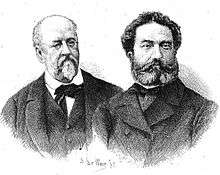
Other realists in the same vein include the duo of Emile Erckmann (1822-1899) and Alexandre Chatrian (1826-1918), who wrote "Les Rantzau" (The Rantzaus, 1882), adapted from their novel, "The two brothers" (1871), who carry on a vendetta for many years because their father's will favored the elder. Erckmann-Chatrian also wrote a more melodramatic piece, "The Polish Jew" (1867), adapted in the English theatre by Leopold Davis Lewis (1828-1890) into "The bells" (1871). Fifteen years ago, Mathias incurs financial troubles and is in danger of losing his inn when he meets a Polish Jew whom he hacks to death with an axe for his money. One day, he faints when another Polish Jew enters his inn to warm himself. His joy in beholding his daughter's marriage is spoiled by dreams of being taken to court for murder. On the marriage day, he falls into a fit and dies.
"The geographical and emotional center of the works of Erck- mann- Chatrian can be marked with considerable precision: it is a section of the western Rhineland, a narrow strip of borderland between Alsace and Lorraine, extending from the summits of the Donon and the Schneeberg on the south (at about the latitude of Strasbourg) to Fin&trange and La Petite Pierre on the north. In this region the Vosges are red sandstone, rising nowhere to high peaks, but weathered into a tangle of precipice and gorge, intersected by narrow, winding valleys, and heavily wooded with fir a beech. " (March, 1935 pp 370-371).
"The Rantzaus"
.jpeg)
Place: Vosges mountains, Lorraine region, France. Time: 1829.
Text at ?
Thirty years ago, Anthony Rantzau’s will stipulated that most of his possessions were to go to his elder son, John, to the detriment of the younger one, James. Since then, the two brothers have been feuding. Most recently, John, now a rich farmer, purchased land between two strips of land belonging to James, meant to impede his brother’s business as a wood merchant. A day before his saint’s day, James’ son, George, surprises his old schoolteacher, Florence, with a gift: Jussieu’s "Dictionary of natural sciences" (1824). George complains of his uncle suing his father because of the land purchase. James, also the village’s mayor, follows his son in Florence’s lodging, swearing he will fight his brother irrespective of court-costs. When the arrival of John and his daughter, Louise, is announced, father and son immediately leave by the back-door to avoid meeting them. John gives Florence a heifer as a gift, which Louise herself took care of since its birth, which pleases Florence’s wife, Mary-Ann as well. "When women are happy, men lead a quiet life," John comments with a smile. John invites Florence to supper with Marry-Ann and their daughter, Juliet, on the following day. Also invited to the party is John’s friend, Paul-Luke Lebel, recently named guard general of waters and forest, whom he intends as his daughter’s husband. To bother his brother living next door, a man who hates music, John encourages Paul-Luke to sing aloud a romance, but the latter’s voice is drowned out when James begins loudly to thresh wheat in his barn. John takes Florence apart to ask him a favor. Fearing his hot temper in case of a refusal, he wants Florence to announce to his daughter his choice as her husband. Florence unwillingly accepts and is shocked on hearing that rather than submit to her father’s will, she would return to the convent of Molsheim where she stayed in her youth. When John learns of this, he lifts his hand to strike his daughter. Florence tries to prevent the blow, but then John turns his rage against him. "Save yourself, Louise, save yourself," Florence cries out. "He’ll kill you." John pushes him out and threatens to prevent her plan. He arranges to announce the marriage, with Florence forced to put up the sign on the door of city hall. To his disbelieving ears, Florence learns from a despondent James that George loves Louise and wants to marry her. When George next meets Paul-Luke, they agree on fighting a duel for Louise’s hand. Troubled by her daughter’s disapproval, Louise’ health deteriorates and her doctor fears the worst, so that John unwillingly goes over to his brother’s house to prepare for their marriage. When the agreements are drawn, George tears up the paper, pointing out that the agreement hurts both parties. Contrite, John and James finally agree to begin anew.
Émile Augier
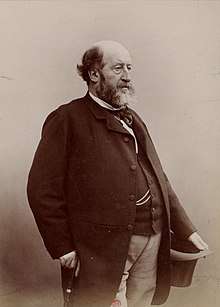
Émile Augier (1820-1889) distinguished himself with "Lions et renards" (Lions and foxes, 1869).
In "Lions and foxes", "clericalism re-appears again in the person of a M de St Agathe, mentioned already in the 'Fils de Giboyer', and here brought boldly upon the stage: he is one who has sacrificed every thing, even his identity, to the order of which he is an unknown instrument, from sheer lust of power wielded in secret. The struggle between these two, D'Estrigaud and St Agathe, for a fortune which neither of them captures, is exciting. In the end, by a sudden irony, the beaten D'Estrigaud abandons the world, forgives his enemies, and, under the eyes of St Agathe, takes to religion, the last resort of rascals, to paraphrase Dr Johnson" (Matthews, 1881 pp 128-129). According to Fitch (1948), "there is a fundamental weakness in the intrusion-plot...in that the key-character is well aware of what is transpiring around her. Catherine is wealthy and as nearly independent as a young woman in her environment could be, and though she is not completely in control of events, we have difficulty in believing that her happiness is seriously menaced. Various reasons have been given for the failure of this play, perhaps all partly valid, but not the least of them is that the author was false to the necessary conditions of his own system of construction: without more blindness on Catherine's part the plot lacks the necessary tension" (p 276).
Weinberg (1938) described the opinions of early French critics of Augier's plays as being "too low, too discouraging, too wicked. It was real; but such realities are not the proper domain of the artist...Most undesirable of all was his constant preoccupation with the demimonde, his portrayal of social groups existing on the fringe of society. Another offense was in the use of the vulgar, brutal language that might be spoken in such groups...There were, however, surprisingly few accusations of immorality...He attacked vigorously, they said, the vices of the time; he gave sane and striking moral lessons; he contributed to the correction of manners" (pp 196-198). Augier ”began as a follower of Hugo, cut adrift, and, in a form which we would call today realistic, began to scourge national foibles now in sarcastic vein, now in the toga of the moralist...It was often said of Augier that he wrote in the spirit of a bourgeois, that he was dry, that he was caustic without being humorous, and he was certainly less flamboyant in style than Hugo, Dumas, and Sardou. But his plays were full of correct observation, and in their frigid, logical survey of his contemporaries they retained an air of reality which prevented them from becoming antiquated” (Grein, 1921 p 97). "For the most part, Augier's dramas deal with conditions arising from the incomplete fusion of classes. Thanks to his bourgeois sanity, he was quick to perceive family perils, social follies, and the baneful spell exerted by money. Yet his mind had serious limitations. 'Beyond simple sentiments and regulated affections,' declares René Doumie, 'he saw only dreams, dangerous chimeras, and romantic evils. Perturbations, inexplicable and unreasoning heartaches, sufferings of the sensibilities ami sicknesses of soul, nothing of these existed in his eyes.' His characters are never haunted by the mystery of life; they know neither the charm of the invisible world nor the tormenting obsession of the infinite. Nor, as is evidenced by 'Paul Forestier', could he portray love" (Scheifley, 1921 p 137). Augier "is noteworthy from more than one point of view. First, he has his place in the development of European drama as a forerunner of Ibsen, Strindberg, Hauptmann and the rest of the moderns. Secondly, he endeavored to produce a most difficult kind of drama, the satiric drama, in which his only successful compeers are Ben Jonson and the younger Ibsen in his verse plays. Finally, as having to all intents and purposes put sociology on the stage for the first time, Augier interest us as exhibiting the special vices of a democratic society and of a democratic government" (Guthrie, 1911 pp 4-5).
"Lions and foxes"
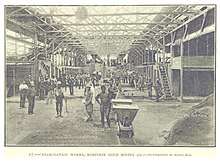
Time: 1860s. Place: Paris, France.
Text at ?
After having enjoyed an illicit liaison with him many years ago during a previous marriage and still remaining friendly with him, Octavia, countess of Prévenquière, speaks favorably of Raoul, Baron D'Estrigaud, as a potential husband for Catherine de Birague, an attractive heiress. Alphonse Sainte-Agathe favors instead his pupil, Viscount Adhemar, Catherine's cousin. The baron visits Catherine first and surprises her with a marriage proposal. When she shows no interest, he insolently proposes that she become his mistress, which she vehemently rejects. Adhemar follows soon after with his own marriage proposal. "But I do not wish to marry," Catherine declares. "Neither do I," specifies the viscount. He merely requests her not to refuse him altogether, to let the question hang in the air, long enough for him to amuse himself for a few weeks in Paris before returning in the provinces. Having heard rumors of his wife's indiscretions, Octavia's husband and Catherine's guardian, Edward, has no wish to see the baron in his house. Instead, he enthuses over the merits of his friend, Peter Champlion, who seeks to exploit a goldmine in Wadai, Africa (present-day Chad), if he can attract enough subscriptions, and at the same time liberate a friend from prison in that region. The tale so inflames Edward, Alphonse, and Adhemar that they subscribe immediately to that project, while Catherine provides the greatest amount of money of all. Later, a pleasant chat between Catherine and Peter is interrupted, to her annoyance, by the arrival of the baron, who subcribes with the others. He then pleads on his own behalf regarding whether he deserves pardon from an unnamed lady and asks Peter for his opinion. When Peter discovers the lady in question is Catherine and observes the baron's excessive familiarity toward him, he becomes angry to the extent of challenging him to a duel. Alarmed, Catherine seeks to prevent it by reminding him of his friend imprisoned in Africa, but this does not halt him. Equally alarmed are Octavia and Alphonse, as Peter's boldness in defending Catherine may compromise her towards a man she already shows "all too much a penchant". Alphonse would like Adhemar to fight the baron, but he cannot honorably do so as a result of owing him a gambling debt. Instead, Alphonse strikes a deal with the baron, whereby the former yields compromising letters of his regarding the use of money he once owed to several people in return for reliquishing his pretensions towards Catherine. Moreover, by paying him Adhemar's gambling debt, he frees his pupil for the duel. However, since Adhemar declines to marry her, the payment puts him in a compromising situation towards her. He opts instead to help Peter by quashing false rumors concerning his use of the subscription money, after which they agree to travel together in Africa.
Edmond Rostand
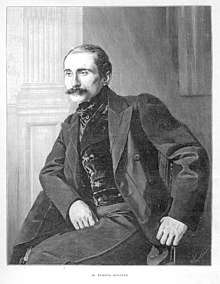
Reaction against the current trend in realism, Edmond Rostand (1868-1918) wrote in the neo-romantic vein, notably "Cyrano de Bergerac" (Cyrano of Bergerac, 1897), based on the life of the 17th century writer and soldier (1619-1655). "The historic Cyrano, born at Paris in 1619, was a soldier in the Gascon regiment of Carbon de Castel-Jaloux and a disciple of Gassendi, Campanella, and Descartes. Aside from his feats of valor in the wars, he fought many a duel and set Paris laughing by his bombast and his pranks. In his comedy, Le Pedant joue, he furnished Moliere with two scenes for Les Fourheries de Scapin, and in his Histoire comique des estats et empires de la lune and his posthumous Les Estats et empires du soleil he composed delightful specimens of the fantastic journey to other worlds, destined to influence Gulliver's Travels. What in Cyrano chiefly appealed to Rostand was the confinement of a fair soul within a grotesque body. He would take this fellow of the bizarre nose and noble spirit, this egoist prone to roar down the timid and floor the strong, and show him gentle to the weak, tender to the fair, and self-effacing in love. It is the character of Cyrano, rather than the ingenuity of the plot, that makes the success of Rostand's play. Since the hero's vitality is superb, what matter that the story and its incidents be spun from the brain of a romancer? It is all of the stuff of which dreams are made, but lively, virile, and jovial" (Chandler, 1920 p 317). “Edmond Rostand wrote ‘Cyrano’ a reaction against the realism and naturalism which has become ascendant in the plays and the fiction of the late 19th century…’Cyrano’ reveals what Rostand and the millions among his audiences miss in today’s world: selflessness and sacrifice, integrity and courage, elegance and honor” (Goldstone, 1969 p 12).
It is, according to Wilson (1937) "a splendid play. The hero is a typically romantic figure grotesque in appearance and great of heart. There are certain fustian lines and unlikely situations, particularly in the fourth act. But the whole play is in the highest degree touching and stirring" (p 146). Grein (1899) enumerated its many strengths. "There is a mighty love interest; there is the imcomparable bravery and audacity of Cyrano, his strength of character, his chivalrous self-denial, his reticence to proclaim his love for Roxane, until well-nigh in his last breath the truth bursts out in the magnificent line: 'No, no, dear love, I did not love you'; there is the note of gaiety in the delightful couple of the Ragueneaus, in the boisterous young cadets, in the jovial monk; there is patriotism, jubilant at first, then glorified in the death of Christian; there is a glimpse into the splendid era of le roi Soleil- in fine, everything to evoke smiles and palpitations and tears" (p 87).
"The main character has universal appeal: Cyrano’s struggle against a cruel fate, his ability to stand fast by his ideals in the face of opposition and defeat, his determination to put a brave face on humiliation and poverty, and finally- when all else fails- to go down with a brave gesture...Working from impulse rather than reflection makes him more comprehensible than most, akin to Hugo’s Hernani and Ruy Blas" (Lamm 1952, pp 172-173). In the same enthusiastic vein, Andrews (1913) wrote that “the central figure is undoubtedly a permanent addition to the world-gallery of romantic portraits, headed by Don Quixote and Don Juan...Cyrano is the grotesque made hero, and wonderfully sympathetic in his power to secure, not for himself, but for others only, the rewards of his genius and of his nobility of soul. Though relinquishing his own happiness, too, this subtle protagonist is conscious of being loved in the person of another...Altogether, there has been nothing at all so distinctive as this character since Figaro” (p 190).
"Cyrano of Bergerac"
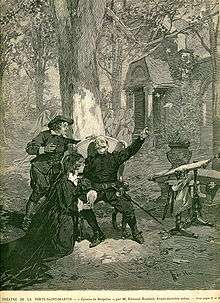
Time: 17th century. Place: Paris, France.
Text at http://www.classicbookshelf.com/library/edmond_rostand/cyrano_de_bergerac/ http://www.classicbookshelf.com/library/edmond_rostand/cyrano_de_bergerac/ http://self.gutenberg.org/eBooks/WPLBN0002171457-Cyrano-de-Bergerac-by-Rostand--Edmond.aspx?&Trail=collection&Words= https://archive.org/details/playsofedmondros01rost https://archive.org/details/in.ernet.dli.2015.151773 https://archive.org/details/twentyfivemodern001705mbp http://www.gutenberg.org/ebooks/41949 https://archive.org/details/in.ernet.dli.2015.151773/page/n13
Cyrano of Bergerac interrupts a stage performance because of the main actor's appearance despite his order not to do so for one month. The viscount of Valvert advances towards Cyrano for this insolence, but he beats him off with his sword. On learning that one of his friends is threatened to death by a large crowd, he beats them all off, among whom eight men die. Afterwards, he receives a summons to meet the woman he loves, Roxane, his cousin. Before her, he loses all his bravado. She reveals she loves. To his joy, Cyrano thinks he is the chosen one, but it is Christian, a cadet-officer, though she has never yet spoken to him. Unwillingly, he promises to protect him. When telling the stories of his exploits, he is taunted of his long nose at every turn by Christian. Cyrano has a hard time restraining himself, but at last reveals he is Roxane's cousin. Overjoyed, Christian shakes his hand, but is saddened to learn he must write her a letter, for as a military man he is weak at that type of thing. Cyrano generously supplies a letter in his place. When Roxane next meets her cousin, she says she is charmed by Christian's wit, surpassing even his. De Guiche, commander of the regiment of guards, arrives to warn her that, while they lay siege to Arras, he will take vengeance on Cyrano, a man under his orders. She counters that the best way to hurt Cyrano would be to deprive him of his regiment of guards, which De Guiche considers proof of her love for him, when it is Christian she would have remain in Paris. One day, Christian accosts her to tell her that he loves her. She closes her eyes to hear more, but he is stuck at that one sentence. "That's the theme. Embroider, embroider," Roxane replies. When he is unable to, she presses him on. "Delabyrinth your feelings," she cries out. When he is still unable to, she shuts the door in his face. In despair, Christian calls to his friend for help, who places himself under her balcony and whispers eloquence to her ravished senses, first through Christian's voice, then his. A Capuchin friar delivers a letter from De Guiche, stating that he expects to see her in the convent where he is hiding, but she tells the friar it is De Guiche's wish to have her marry Christian, which she does, the commander, thanks to Cyrano, arriving too late to prevent it, but yet ordering Christian off to war against the Spaniards. During the siege of Arras, De Guiche, to avoid being an obvious target to musket-fire, drops the white scarf indicating his rank, which Cyrano, at great risk, succeeds in recovering. While half the army move away to obtain food provisions, De Guiche forms a plan to have the Spaniards attack the company of Gascon cadets. The soldiers are suddenly surprised by the arrival of a coach and even more so when they see emerging from it Roxane, along with food provisions and a pastry-cook. Christian guesses that Cyrano loves Roxane and desires him to say so to her. He is about to but then hears news that his rival has been shot to death. "It is over," he says to himself. When the enemy charges, he exclaims: "I have two deaths to avenge: Christian's and my happiness'." Fifteen years later, Roxane is a nun in the habit of receiving a visitor every Saturday: Cyrano, now poor with many enemies and a damaged skull resulting from a heavy piece of wood thrown from a window by one of these. One day, he arrives slightly later than his usual time for his date with Roxane, but, though fatally weakening, does not tell her about it. Roxane wears in a locket around her neck the last letter "Christian" wrote, which Cyrano asks to read aloud, in which he tells her: "I will die. It is tonight, I think, my loved one. My soul is heavy with unexpressed love, and I die." Roxane is startled at the fervor of Cyrano's tone. As he continues reading, she asks: "How can you continue reading it now? It is night." Amazed, she suddenly discovers the answer to her own question. "It was you," she declares. Although he denies it, she adds miserably: "Though I loved only one, I lose him twice." He senses the coming of another type of woman, a grislier one, liable to make him "booted in marble, gloved in lead". Though recognizing death takes all, there is one thing she cannot take: "My panache," he asserts.
Alfred Jarry
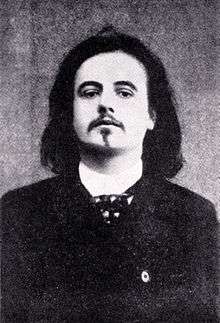
In a more violent reaction against realism than Rostand's, Alfred Jarry (1873-1907) wrote "Ubu roi" (Ubu the king, 1896) in the manner of an absurd farce, a precursor to the Theatre of the Absurd of the late 20th century (LaBelle, 1980).
"Ubu the king" "was regarded by critics as a monstrous birth of naturalism, conceived in a mental debauch. Ubu is the human beast unchained. A former ruler of Aragon, reduced to the condition of a mercenary, he is fired by his wife's ambition to slay his master, the King of Poland. With wild mirth, this Rabelaisian Macbeth commits gross atrocities. Jarry, who was hailed by his friends as the most original dramatic genius, and by his foes as the corrupter of a generation, excused his licentious eccentricities on the ground that they were symbolic. Like other revolutionary bohemians of Montmartre, he was happy only when lashing the bourgeoisie into angry protest. Even his scenery was designed to startle, with its trees, houses, and human figures as geometrical as the properties of a Noah's Ark. It is in Jarry's work that the tendency toward 'muflisme' (boorishness) and outrageous extravagance culminated. Ubu roi descends from the Grand Guignol and from Andre de Lorde's Theatre d'Epouvante. Hilarity and insanity are the two poles between which the providers of such spectacles oscillate" (Chandler, 1920 pp 74-75).
“The story of ‘Ubu the king’ is basically a naïve childish fantasy. The play is Jarry’s warped version of the typical fairy tale- a king killed by a wicked usurper, the young and virtuous rightful heir to the throne as avenger, battles fought between troops who resemble little tin soldiers of a toy box, eerie (but not too eerie) ‘supernatural events’, a fight with a make-belief bear, and so on” (Wellwarth, 1971 p 5). “The fantastic grotesque figure of Ubu is a symbol of the negation of traditional morality and of the disembodied, mindless, and incomprehensible forces that crush men like juggernaut, driving them without discernable reason to the ultimate senselessness and degradation of death…Ubu also represents the animal instinct in every person: the primal id that refuses to remain suppressed” (Wellwarth, 1986 p 48). He is “a grotesquely ugly embodiment of our most despicable instincts, whose involvement in any situation reveals his own amoral and anti-social qualities in all the participants, exposing the rapacity, avarice, self-serving treachery and ingratitude, conceit, cowardice and simple greed” (Innes, 1981 p 22).
"Alfred Jarry's Ubu Roi has received considerable recognition and acclaim in recent years for its role as a parent play to twentieth-century avant-garde drama" (Bierman, 1975 p 226). "In a recent book entitled La Comédie, Pierre Voltz sums up the form of comedy which is expressed in Jarry's theatre. Referring to it as the 'comedy of the absurd', he proposes that this type of comedy arises from the absurdity of Ubu's behavior, which is "cruelly and irrefutably logical" while at the same time the actions of a purely instinctual being. It is a variation on this type of comedy which the exponents of the theatre of the absurd have perfected" (Grossman, 1967 p 476). Jarry “wanted to create a theatre based on stylization, or extreme simplification...The second of Jarry’s overriding aims was...to express themes which were...universal and eternal, resulting in the creation of archetypes and of ‘myth’...[so that] we must reject any interpretation of ‘Ubu the king’ as a satire upon a specific historical period or social class...Jarry’s third basic aim in the staging of ‘Ubu the king’...was the creation of a comic theatre based not on verbal wit, but on the exploitation of...grotesque school-farce. For Ubu is...the embodiment of unutterable stupidity...The monstrously fat belly of Ubu, the slapstick of the battle scenes and fights, even the implausible rapidity with which events follow one another, all of these partake of the exaggeration and unreality of farce...The comedy of the play derives also from an almost systematic exploitation of incongruity, an incongruity which is frequently pushed to the point of outright contradiction and sheer absurdity...such as a tree growing at the foot of a bed...and [human beings acting like marionettes]...The fourth and final aim of Jarry...is [to present] in many respects the world of childhood” (Beaumont, 1984 pp 111-118).
Hubert (1984) pointed out the numerous references to food items in the play. Ubu the king himself is roundish and possesses a "truly Gargantuan appetite. But...contrary to the 16th-century hero whose appetite incorporates all aspects of life, including the spiritual, the modern character is strictly limited to his gut" (p 76). Jarry distorts middle class tendencies such as eating well: Ubu is a glutton and fat, “Mother Ubu inveigles Ubu to usurp the throne by assuring him of a plentiful supply of food. The middle class brain is fixed on money, so is Ubu as he kills to gain more. [One may add that the middle class is discrete on sexual subjects which Ubu leaves unmentioned.] The mother is put on a pedestal, so that Mother Ubu in her apron goads her husband into being worse than he already is. The bourgeois possesses a work ethic, so does Ubu when he wishes to destroy. Moreover, the peasants are depicted as amoral and money-grubbing as the middle-class...The wasteland of evil...is [only] broken by the honest Bougrelas" (LaBelle, 1980 pp 90-94) "When Jarry wrote 'Ubu roi' he was rebelling not only against the outmoded conventions of the current drama, as the previous 'avant gardists' had done, but against absolutely everything. Jarry rebelled against all things, both physical and metaphysical, to the point where he had to invent a new ‘reality’ beyond the physical and metaphysical...The famous opening line of Ubu...'merdre’ [linguistic distortion of the word 'shit' as in "shite']...was like a slap in the face of society...The various scatological references that are sprinkled through the play represent rebellion on its most instinctive and elementary level- the level of a child's refusal to bow to bathroom training...primitive and untutored also in this respect- that it was protest based on blind nihilism...Ubu is dirty, treacherous, greedy, ungrateful, cowardly, and cruel...The play is Jarry's warped version of the typical child's fairy tale- a king killed by a wicked usurper, the young and virtuous rightful heir to the throne as an avenger, battles fought between troops who resemble little tin soldiers of a child's toy box, eerie (but not too eerie) 'natural' events, a fight with a make-believe bear" (Wellwarth, 1962 110-112).
"Ubu the king"
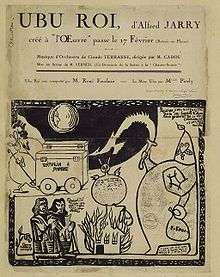
Time: 1880s. Place: Poland.
Text at http://www.archive.org/details/uburoidramain5ac00jarr
Ubu is encouraged by his wife to revolt against Vencesclas, king of Poland. With Captain Border's help, they succeed in killing him, with Ubu as the new monarch. To ensure the people's loyalty to the crown, the queen suggests yielding some money to them, which he reluctantly accepts. But to get his money back, he confiscates the fortunes of his noblemen and then kills them. Moreover, he interrogates magistrates and administrators, but, not liking what he hears, kills them as well. He next extracts money from the peasants, as the master of finance, and treacherously imprisons Border, who escapes and flees to the Russian czar, Alexis, who invades Poland. Ubu the king must war against the Russians, looking, according to his queen, "like an armed pumpkin". Meanwhile, Vencesclas' son, Bougrelas, leads an armed revolt against the Ubus, so that there is trouble both from within and without. The queen is forced to flee high up in the mountains. Though shot by the czar's troups, Ubu succeeds in tearing Border apart and escaping. In his view, he would have been able to kill the czar: "had not an inexplicable terror combated and annulled in us the effects of courage," he explains. Pile and Cotice, two of Ubu's paladins, attack a bear and, despite being bitten, kill it, Ubu ascribing their success to his own person. "We did not hesitate to mount this elevated rock," he declares, "so that our prayers had a shorter way to go before arriving in heaven." While Ubu sleeps, the queen, afraid he might have heard of her robbing his treasury, appears in the night in the form of an angelic apparition, specifying what a wonderful wife he has, but at dawn, he recognizes her and tears her apart. At last Bougrelas succeeds in overthrowing the king, who escapes out of the country in a boat, hoping eventually to obtain a position in France as minister of finance.